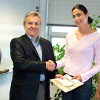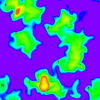News Archive
ACTS Collection Sponsors Fifth Annual Workshop
The 2004 DOE Advanced CompuTational Software (ACTS) Collection workshop was held Aug. 24-27 at Berkeley Lab. Read More »
LBNL’s Evaluation of Earth Simulator Performance Nominated for Best Paper Award at SC2004
With the re-emergence of viable vector computing systems such as the Earth Simulator and the Cray X1, there is renewed debate about which architecture is best suited for running large-scale scientific applications. In order to cut through the conflicting claims of fastest, biggest, etc., a team led by Lenny Oliker of CRD’s Future Technologies Group put five different systems through their paces, running four different scientific applications key to DOE research programs. As part of… Read More »
Cosmology Code’s Performance Characteristics Generates Paper
When the team from LBNL’s CRD and NERSC Divisions spent a week conducting performance evaluations of Japan’s Earth Simulator in late 2003, one of the five codes they intended to run did not scale well enough to be used. According to team leader Lenny Oliker, the application MADCAP (the Microwave Anisotropy Dataset Computational Analysis Package), a parallel implementation of cosmic microwave bacground map-making and power spectrum estimation algorithms, has been tuned since then… Read More »
China’s NSF Honors Lin-Wang Wang with Outstanding Young Researcher Award
Lin-Wang Wang, a staff scientist in the Scientific Computing Group, recently won an Overseas Outstanding Young Researcher Award from the National Natural Science Foundation  of China, China’s equivalent of the U.S. National Science Foundation. These awards are given to recognize the recipients’ academic achievements in their fields and to encourage… Read More »
of China, China’s equivalent of the U.S. National Science Foundation. These awards are given to recognize the recipients’ academic achievements in their fields and to encourage… Read More »
Summer Students Further Their Careers While Participating in Cutting-Edge Research
Each summer, Berkeley Lab’s Computing Sciences organization hosts students from various universities in the United States and abroad. Additionally, through the DOE’s Computational Science Graduate Fellowship (CSGF), which works to identify and support some of the best computational science graduate students in the nation, fellows participate in a three-month practicum at a DOE research laboratory. Berkeley Lab is hosting two CSGF fellows this summer. One CSGF fellow at the Lab,… Read More »
Python/Globus Tools Speed Up Development of Data Grid for LIGO
BERKELEY, Calif. Programming tools developed at the U.S. Department of Energy’s Lawrence Berkeley National Laboratory by Keith Jackson and his colleagues in the Computational Research Division’s Secure Grid Technologies Group have been used to set up an efficient system to distribute new data that will put the predictions of Einstein’s General Theory of Relativity to the test. To date, more than 50 TB of data from LIGO has been replicated to nine sites on two continents, quickly and… Read More »
They’re Cool, but How Can We Use Them?
Start with a quantum dot — a conglomeration of a few hundreds or thousands of atoms in which it is possible to control a single electron. Attach to the dot four rods of another material which are electronically coupled to the central quantum dot, then have the rods start branching. You’re creating nanocrystals in various shapes that may have useful electronic or optical properties. But how do you find out what those proper- ties are? [image class="right"… Read More »
Anatomy of a Web(bed) Legend: Virtual Frog Web Site Still Making a Splash After 10 Years on the Web
In the wild, a frog may live to 10 years, assuming it survives tadpolehood and doesn’t get eaten by a bird or a fish or some other creature. On the Web, though, a virtual frog named “Fluffy” has easily notched its tenth year despite millions of dissections. Launched in June 1994, by the U.S. Department of Energy’s Lawrence Berkeley National Laboratory, the Virtual Frog Dissection Kit website allows users to virtually dissect a frog without all that smelly formaldehyde of high school… Read More »
Raquel Romano Selected As Recipient of Alvarez Post-Doctoral Fellowship
Raquel Romano, who joined the Imaging and Informatics Group in the Computational Research Division (CRD) in January 2004, has been selected as the next Luis W. Alvarez Post-Doctoral Fellow in Computational Science. Read More »
Scientific Data Management Center Helping Scientists Focus on Science, Not Data
While terascale supercomputers are giving computational scientists unparalleled research capabilities, these systems are also producing huge amounts of data to be managed. Similar situations confront researchers using massive experimental facilities, where new experiments will be generating unprecedented quantities of scientific data. As a result, researchers often spend more time trying to find ways to manage their data instead of analyzing them. To help scientists make effective and… Read More »







 Instagram
Instagram YouTube
YouTube
